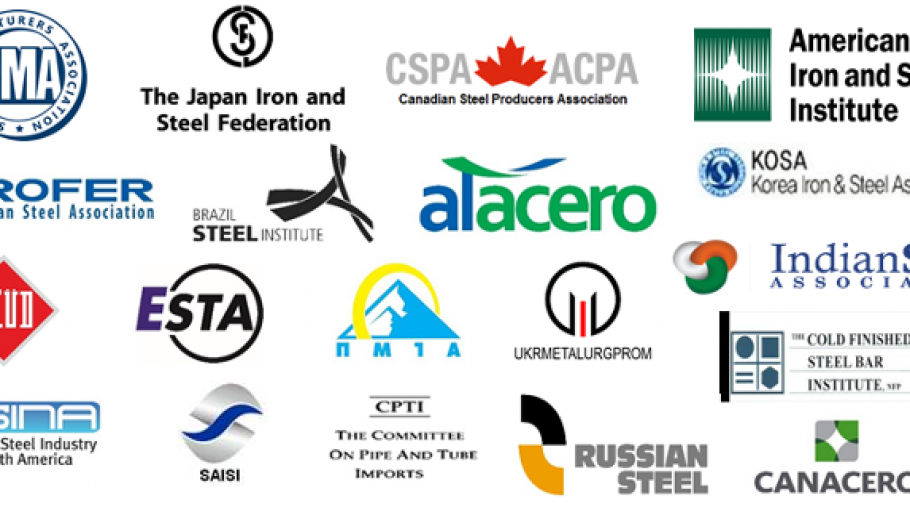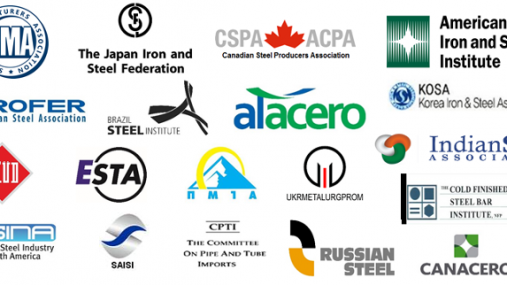
Press releases » Global steel industry groups call for urgent action on steel excess capacity crisis
Global steel industry groups call for urgent action on steel excess capacity crisis
Downloads and links
Recent updates

Nineteen steel industry associations in the Americas, Europe, Africa and Asia today called for the governments of steelmaking economies to step up efforts to effectively tackle persistent global excess capacity in the steel sector, including by quickly implementing strong rules and remedies that reduce excess capacity, its impact and its causes. The industry groups emphasized that governments should use all available mechanisms and negotiation forums, including the G20 Global Forum on Steel Excess Capacity, to:
The industry groups commended the September 30, 2019 statement by Ulf Zumkley, Chairman of the Organization for Economic Cooperation and Development’s (OECD) Steel Committee, which expressed grave concerns about the unexpected growth of new steelmaking facilities in 2019, exacerbating global excess capacity and contributing to trade tensions. Participants in the OECD Steel Committee reiterated the need for further capacity reductions in relevant steel-producing economies and urged members to extend the G20 Global Forum on Steel Excess Capacity past its current expiration in 2019.
“We are grateful for the efforts made to date by the G20 and OECD governments to address excess capacity, and to support a playing field at the G20 Global Forum on Steel Excess Capacity and OECD Steel Committee,” the industry groups said. “Unfortunately, effective reductions in capacity and concrete actions to remove government measures that distort markets, including raw materials markets, have not been adequate to date. Efforts by governments to eliminate practices that lead to excess capacity should be redoubled. We are hopeful that the diligent efforts of Japan, the current G20 Chair, are successful in extending the G20 Global Forum on Steel Excess Capacity beyond 2019, and we urge all G20 and OECD steelmaking economies to pursue all vigorous means to obtain substantive results on the critical problem of steel excess capacity.”
The steel industry groups issuing the call for urgent action include representatives of: Steel Manufacturers Association (SMA), American Iron and Steel Institute (AISI), EUROFER (European Steel Association), Canadian Steel Producers Association (CSPA), CANACERO (the Mexican Steel Association), Alacero (the Latin American Steel Association), Brazil Steel Institute, Turkish Steel Producers Association, Republican Association of Mining and Metallurgical Enterprises (AMME), The Japan Iron and Steel Federation (JISF), European Steel Tube Association (ESTA), Korea Iron and Steel Association (KOSA), Specialty Steel Industry of North America (SSINA), South African Iron and Steel Institute (SAISI), The Cold Formed Steel Bar Institute (CFSBI), Association of Enterprises UKRMETALURGPROM (Ukraine), Russian Steel Association, Indian Steel Association, and The Committee on Pipe and Tube Imports (CPTI).
***
Contacts:
SMA – Phil Bell, bell@steelnet.org, 202.296.1515
AISI – Lisa Harrison, lharrison@steel.org, 202.452.7115
CSPA – Catherine Cobden, c.cobden@canadiansteel.ca, 613.238.6049
CANACERO – Salvador Quesada, squesada@canacero.mx, 52 (55) 5448-8162
EUROFER – Charles de Lusignan, charles@eurofer.be, 0032 2738 79 35
Alacero – Fernanda Valente, fevalente@alacero.org, (55 11) 3195-5803
Brazil Steel Institute – Débora Oliveira, debora.oliveira@acobrasil.org.br, 55 (21) 3445-6327 | 6300
JISF – Shigeru Hagiuda, hagiuda@jisf.or.jp, 81 3 3669 4835
Russian Steel – Maria Simonova, info@russtal.ru, 79153226225
CFSBI – Mark Redding, mredding@bargrind.com, 630.868.1234
Turkish Steel Producers Association – Veysel Yayan, veyselyayan@celik.org.tr, 903124663734
ESTA – Dominique Richardot, esta.dr@orange.fr, 33 1 41 31 56 45
AMME – Alisher Zholdybayev, zholdybayev@agmp.kz, 7 7172 689 601
SAISI – Charles Dednam, charles@saisi.org, 27 12 380 0900
KOSA – Min-Chul Lee, minchul.lee@ekosa.or.kr, 82 02 559 3501
Ukrmetalurgprom (Ukraine) – Oleksandr Kalenkov, office@ukrmetprom.org,0442790525
SSINA – Larry Lasoff, LLasoff@kelleydrye.com, 202.342.8530
CPTI – Tamara Browne, tbrowne@schagrinassociates.com, 202.223.1700
Indian Steel Association – Arnab Kumar Hazra, a.hazra@indsteel.org, 919958599032

Download files or visit links related to this content
Developed with the support of the Offshore Wind Foundation Alliance and European Wind Tower Association, the position paper outlines the strategic importance of wind components for Europe’s green transition and calls for targeted measures to strengthen their role within the NZIA.
Brussels, 2 April 2025 - The latest data unveiled by the OECD in its meeting in Paris draw an extremely worrying picture, where global steel excess capacity is expected to grow from an estimated 602 million tonnes in 2024 to 721 million tonnes by 2027 – over five times the EU's steel production. The European steel industry - already severely hit by the spill-over effects of global overcapacity and the U.S. steel import tariffs - reiterates the crucial need for strict and effective EU post-safeguard measures to ensure its survival.
Brussels, 19 March 2025 – The Steel and Metals Action Plan, unveiled today by the European Commission, provides the right diagnosis to the existential challenges facing the European steel industry. Concrete measures need to follow swiftly to reverse the decline of the sector, re-establish a level playing field with global competitors, and incentivise investment and uptake of green steel in the market.